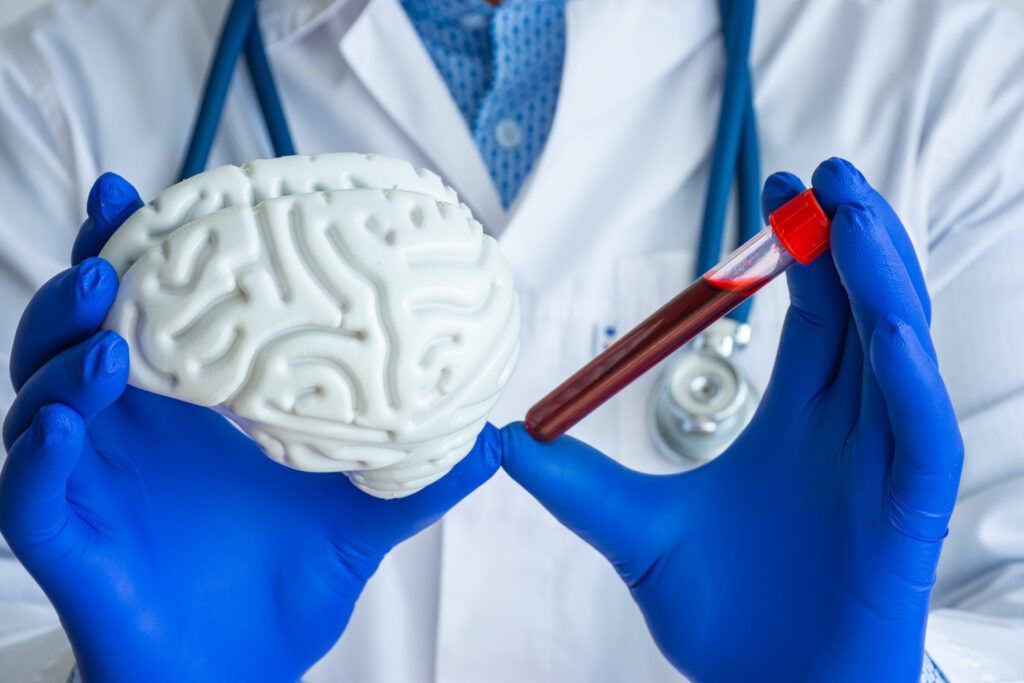By Aidan Asbill, Biotech Analyst
Biogen shocked the world when it got FDA approval for the Alzheimer’s drug, aducanumab. However, just months later Biogen’s drug would be heavily criticized for not clearly demonstrating clinical benefit. With so much criticism about ineffectiveness, how was Biogen able to gain FDA approval? The answer is biomarkers, more specifically amyloid plaque measured with PET scans which served as a key part of the FDA’s reason for authorizing approval of aducanumab. During trial data, the drug was able to show substantial reductions in amyloid plaque, which is present in higher amounts in some patients with Alzheimer’s disease. A hypothesis among researchers is that if you can get rid of these amyloid plaques, you can keep the brain cells from deteriorating and stop the cognitive decline. However, this link has never been conclusively proven.
For this reason, the FDA thought it was reasonable that the drug would slow or possibly even reverse the progression of Alzheimer’s disease in patients. This caused an outrage in the scientific community with some people going as far as to say they would not prescribe the drug due to ambiguous at best benefits. The FDA staff’s own review of the Biogen data had previously concluded that it is not clear that there is any linkage between reduction in plaque and improvement in patient cognition. To make matters worse the FDA does not require that patients undergo plaque measurements before receiving aducanumab, which seems like a huge oversight with prescribers unable to see the plaque reduction themselves. With that being said, to further understand the FDA’s controversial approval let’s first look at biomarkers and how they can make or break biotech companies.
Biomarkers Use in Biotech
Biomarkers have been commonplace in the medical field for many decades now. By definition, a biomarker is a measurable indicator of the severity or presence of a disease or in layman terms anything that can be used to identify a disease in patients, independently of symptoms. A biomarker is supposed to be an objective assessment of a patient, regardless of how an individual feels, functions, or survives. Examples of biomarkers can vary from simple blood pressure tests to complex genetic tests of blood and tissues. However, when it comes to the biotech world, the biomarkers become very complex as they seek to tackle chronic disease. When it comes to these chronic diseases, treatment may require patients to take medications for years and accurate diagnosis is particularly important. Oftentimes these medications come with strong side effects that are expected during the treatment. For this reason, biomarkers are becoming more integral because they can diagnose chronic diseases before they cause irreversible damage to patients.
New and effective biomarkers have been invaluable to the scientific world particularly in the 1980s with the outbreak of HIV. Researchers quickly came up with an HIV antibody blood test in just two years that was crucial in stopping the spread of AIDS. Without this simple test, HIV-infected donors could have infected the blood supply causing a bigger global outbreak. The test also let people know they were HIV positive before they had symptoms and was crucial in treating patients early when effective treatments arrived. Biomarkers have been an important tool in the scientific world as early as the 1950s when scientists identified cardiac troponin an enzyme released by cells in the heart. Later in the 1990s, scientists were able to develop a lab test to measure it and create an extremely accurate biomarker for cardiologists to determine if a patient had experienced a heart attack. However, while well-established biomarkers are a crucial process in determining symptoms and treatment options in patients, it takes many years even decades for scientists to discover the relationship between biomarkers and clinical outcomes. To make matters worse, advancements in technology have allowed scientists to create and find more biomarkers than ever before. With so many relatively new biomarkers in play, many companies have drawn conclusions without adequate data to make life-altering decisions for their patients.
With many companies using biomarkers to draw quick conclusions, in 1997 the National Institute of Health pleaded for guidelines and legislation development that would regulate the ethical dimensions of biomarker studies. When used properly biomarkers serve as critical signs of a disease, but in recent years companies have used biomarkers as almost a guarantee of a diagnosis of a disease. For example, a blood test showing high levels of PSA has been one of the most consistent signs of the presence of cancer in the body. However, elevated levels of PSA alone aren’t enough to quantify a patient having cancer, they may just have an infection causing these levels. Misunderstandings about PSA may have caused many unnecessary surgeries, and a lot of needless suffering.
Abuse of biomarkers has caused a slippery slope in the biotech industry, with many biomarkers being used as surrogate endpoints to assess clinical outcomes. When used as outcomes in clinical trials, biomarkers have oftentimes been considered to be surrogate endpoints, but it can be very difficult to prove the relationship between these biomarkers and real world clinical outcomes. These clinical endpoints may not actually be part of the pathophysiological pathway that results in that endpoint, or in other words, they may be identifying the symptoms rather than the root cause. This is especially true concerning progressive diseases that desperately need a treatment that cures the disease, rather than just alleviates symptoms until the disease turns fatal.
Biomarkers in Alzheimer’s
Diseases such as Alzheimer’s often begin with very few symptoms to detect the disease. Biomarkers in the Alzheimer’s space have been very important to detect elevated rates of beta-amyloid plaques in the patient, which researchers think is the cause of Alzheimer’s. In these cases, where patients are symptom-free, these biomarkers can be crucial in identifying and treating high-risk individuals and giving them reliable treatment before their symptoms worsen.
Biogen’s new treatment was approved based on the strength of biomarker improvement. However, now the drug has been met with constant criticism with 11 FDA members quitting in protest, even while Alzheimer’s advocates have rejoiced. The controversy has stemmed from Biogen’s drug aducanumab being unable to clearly demonstrate meaningful improvements in cognition after 9 months of treatment. The drug works by treating and reducing amyloid plaque, which Biogen has hypothesized may be the cause of Alzheimer’s disease. However, a 2019 study found that only 64% of patients with Alzheimer’s have elevated positive amyloid PET results, which has served as the basis for the drug. This begs the question, are these amyloid plaques the cause of the disease, or merely a symptom? While this treatment may help alleviate symptoms, it remains to be seen if the drug will actually cure Alzheimer’s disease, like originally advertised.
In the wake of this controversy, other biotech companies with alternative Alzheimer’s treatment have had their stocks skyrocket, with investors eager to find an Alzheimer’s cure. Since Biogen’s approval, competitors Annovis bio rose nearly 70% from $70 a share to $120 and Cassava sciences doubled going from $70 a share to $140. However, this quickly changed when clinical data from Annovis Bio came out with results that weren’t statistically significant. Annovis bio is down 70% and caused a mass sell-off in the Alzheimer’s sector with Cassava sciences down 50% and Alector down 40%. Annovis drug posiphen was targeting proteins in the brain that make up the nerve cells that communicate with one another. The company hypothesized that this would improve cognitive function and had promising results with their Alzheimer’s disease assessment scale. However, it seems like at the moment the hypothesis may be wrong with the company unable to present compelling results for Alzheimer’s treatment. On the other hand, Cassava Sciences was able to be the first Alzheimer’s treatment to show improvement after 9 months. Clinical trials of Cassava’s drug simufilam showed an improvement of 66% according to their ADAS- Cog scores and an overall 22% improvement in patients showing less decline compared to patients who didn’t have the treatment. While Cassava Sciences may be a shining light of hope for Alzheimer’s treatment it may also be more speculation based on tests that may or may not actually treat the underlying cause. Some researchers have even raised doubts about the true benefit of the drug and that the reported benefits may be overblown.
Biomarkers have served as great tools to help find and treat chronic diseases before they destroy patients’ health. However, it’s very challenging for scientists to understand the relationships between biomarkers and clinical outcomes. This is especially difficult in clinical trials which oftentimes utilize new and untested methods to treat deadly diseases. This may serve as a cautionary tale to investors who are often biased towards good news and positive date. With that being said this data can be easily misleading and does not always correlate to lucrative and effective treatments. The world of biotech can be very volatile and unforgiving, but ultimately it will be up to investors to do their own researcher to differentiate fact versus speculation.








1 thought on “THE PROMISE AND PERIL OF BIOMARKERS”
Comments are closed.